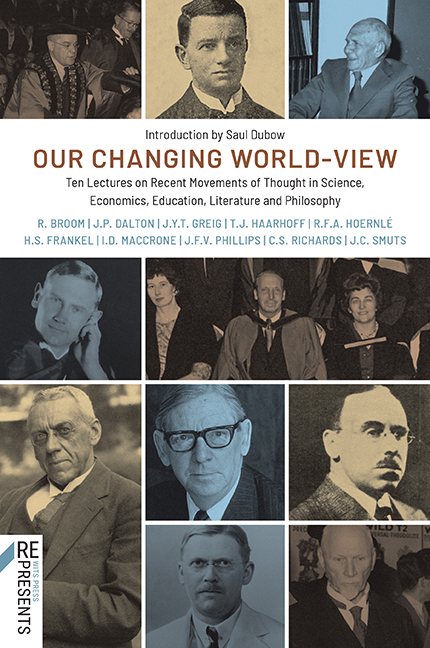 Our Changing World-View
Our Changing World-View Book contents
- Frontmatter
- Contents
- Introduction
- Preface
- Miscellaneous Frontmatter
- 1 Some Recent Scientific Advances in Their Bearing on Philosophy
- 2 The Material World—Yesterday and Today
- 3 Evolution—Design or Accident?
- 4 Man at the Crossroads
- 5 Psychology in Perspective
- 6 Literature in the Machine Age
- 7 The Holistic Attitude in Education
- 8 Our Changing Economic World
- 9 Africa in the Re-Making
- 10 Old Truths and New Discoveries
2 - The Material World—Yesterday and Today
Published online by Cambridge University Press: 12 October 2021
- Frontmatter
- Contents
- Introduction
- Preface
- Miscellaneous Frontmatter
- 1 Some Recent Scientific Advances in Their Bearing on Philosophy
- 2 The Material World—Yesterday and Today
- 3 Evolution—Design or Accident?
- 4 Man at the Crossroads
- 5 Psychology in Perspective
- 6 Literature in the Machine Age
- 7 The Holistic Attitude in Education
- 8 Our Changing Economic World
- 9 Africa in the Re-Making
- 10 Old Truths and New Discoveries
Summary
“Of the Kosmos in the last resort, Science reports many doubtful things, and all of them appalling. There seems to be no substance to this solid globe on which we stamp; nothing but symbols and ratios … that way madness lies; Science carries us into zones of speculation where there is no habitable city for the mind of man.
“But take the Kosmos with a grosser faith, as our senses give it to us. We behold space sown with rotatory islands, suns and worlds and the shards and wrecks of systems; some, like the Sun, still blazing; some rotting like the Earth; others, like the Moon, stable in desolation. All of these we take to be made of something we call Matter, a thing which no analysis can help us to conceive, to whose incredible properties no familiarity can reconcile our minds.”—R. L. Stevenson, “Pulvis et Umbra.”
—Introductory.
The general idea underlying this course of lectures is that we should endeavour to give an account of the present-day position in certain branches of knowledge, and, when possible, contrast current views and theories with those in vogue a generation or more ago. In this scheme mine is the task to deal with the material world. You may wonder why this responsibility is entrusted to a mathematician, for it is surely evident that the world of concrete fact surrounding us can have little in common with the world of abstract symbolism in which a mathematician lives.
It is generally assumed that matter, as we know it, is a simple entity compared with humanity; it exhibits no caprice, no complexities, endures no loves or hates; it lies outside the domain of politics or of economics; it appears to be inherently stable, simple, dull. Perhaps in this dullness we may find the reason why Professor Hoernlé—to whose energy and enthusiasm are due the inception and successful inauguration of these lectures—deemed it probable that the subject would prove congenial to a mathematical mind.
However that may be, it has happened that my whole working life has been spent in intimate contact with physical theory, and that it has covered an epoch of astonishing fruitfulness in scientific discovery.
- Type
- Chapter
- Information
- Our Changing World-ViewTen Lectures on Recent Movements of Thought in Science, Economics, Education, Literature and Philosophy, pp. 21 - 46Publisher: Wits University PressPrint publication year: 2021
